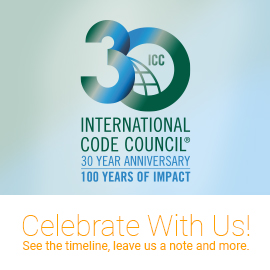
Deadline Nears for Code Council’s Inaugural Public Official Award
![]() Nominations for the International Code Council’s first-ever Public Official of the Year Award close on April 15. The award will recognize senior governmental officials, elected or appointed, for their contribution to building safety. Click here (www.iccsafe.org/POYA) for criteria and nomination form.
Nominations for the International Code Council’s first-ever Public Official of the Year Award close on April 15. The award will recognize senior governmental officials, elected or appointed, for their contribution to building safety. Click here (www.iccsafe.org/POYA) for criteria and nomination form.
“Without the support of government officials, codes could not be developed, adopted or enforced,” ICC CEO Richard P. Weiland said. “The Code Council already recognizes those who contribute to building safety as code and fire officials among others, but there are many public officials that play an important role in the process that don’t fit into the current categories. We need to recognize their contributions also.”
The first recipient of the Award will be named in May 2011 during Building Safety Month. Criteria for the award include:
- Demonstrating a commitment to building code adoption and enforcement;
- Encouraging adoption of codes to improve building department administration and safer construction;
- Documenting an increase in code enforcement during an official’s tenure;
- Speaking publicly about the importance of adopting and enforcing the most recent building codes; and
- Standing up to lobbying efforts that oppose code adoption, enforcement and standardization.
“The establishment of this award serves to remind everyone that there are many participants contributing to the safety of our communities, Weiland said. “There is a rich pool of deserving recipients, and we look forward to this new annual award starting this year.” Weiland said.
The International Code Council, a membership association dedicated to building safety, fire prevention and energy efficiency, develops the codes used to construct residential and commercial buildings, including homes and schools. Most U.S. cities, counties and states choose the International Codes, building safety codes developed by the International Code Council. The International Codes also serve as the basis for construction of federal properties around the world, and as a reference for many nations outside the United States.





